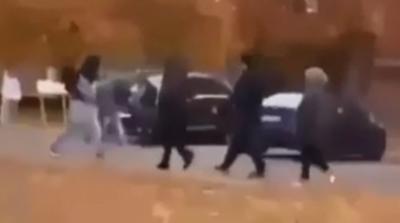One thing I learned reporting from war zones: Life is pitilessly cheap.
So, too, sometimes on the streets of Toronto, where gunfire can erupt over a wrong-way glance, an insult, the flash of fingers in sign language that signals a wordless threat and looming malevolence.
A young man born in Canada who spent years in Iraq as a child may not have been able to tell the difference, conflating Scarborough with Baghdad, and misperceived the immediate danger — assuming the person lunging at him had a gun, as did he, instead of a knife, as was the case.
But he claimed to have been aware of neighbourhood “politics,’’ alignments drawn along territorial boundaries. As a teenager he understood all about deep-rooted tensions among local youth and rising gun violence. And why wouldn’t he, when approached by another teenager “speed walking’’ towards him, wearing a balaclava, hands in his pockets, anticipated that his life was at risk. Outside a high school where, in recent weeks, there had been stabbings, fights, students rushed to hospital ERs. In a ‘hood where he and his brother had earlier been shot at while walking their dog.
“It made me think, OK, my neighbourhood is not as safe and not as stable as I thought … like Iraq,’’ he testified at trial.
After that earlier shooting, a friend had offered him a gun to protect himself, which he accepted. Firearms were hardly foreign to him. In Iraq, he explained, it was common to fire off weapons at wedding and funerals. He’d handled guns before.
But the youth who’d lunged at him — not a student from the same school — didn’t have a gun, only the knife, on that Halloween day in 2022. The teen who believed himself targeted for imminent death — all of this unfolding in a chain of events following an argument between the accused and a teenage girl who’d taken offence at the lyrics of a rap song he was listening to, humming along with, the girl semaphoring five fingers down, signifying disrespect — drew a pistol from his waistband and spontaneously fired, then pulled the trigger three more times as he fell backwards.
The Crown’s position was that the victim had lunged towards the shooter in an attempt to disarm him. The youth with the gun also accidentally shot his own brother. The whole episode was captured on cellphone video recorded by another student near the scene and played at trial.
Yet a jury earlier this month acquitted the defendant — 17 at the time of the shooting — of second-degree murder, accepting his claim that he’d fired in self-defence. Which, frankly, completely shifts the goalposts of what constitutes self-defence, opening up a whole new dimension of justifiable homicide. “I thought he had a gun’’ usually works only for cops.
He was also found not guilty of reckless discharge of a firearm.
While police had initially been permitted to release the suspect’s name — the youth ultimately turned himself in — he can no longer be identified, protected by a standard publication ban under the Youth Criminal Justice Act.
Most details can’t be disclosed because of the ban or were never even addressed at trial, such as why his parents would have taken him to a war-ravaged country such as Iraq before he returned to Canada without them. It is widely acknowledged, however, that children who grow up in chaotic war zones, in countries seized by civil war and displacement, have a different understanding of life and death, forever traumatized by the experience.
I would further suggest that a newer generation of gang and criminal enterprises have coalesced around ethnicity — countries of origin or heredity, a core commonality. But no matter how many times I try to raise the issue with police, they absolutely refuse to discuss it, assert that has no bearing. Burned by the release of race-based crime statistics decades ago, they’re not going there again. Even if ethnicity does not equate to race. Even if it seemingly matters — just study the homicide log — as much as geographical location in the city, block by block in some specific areas riven by violence and extortion and revenge shootings.
The aforementioned shooter walked out of jail on Thursday following a bail hearing on his remaining charge of possession of a firearm. He’d been in custody for three years and will formally plead guilty at a sentencing hearing in September. Of apparently no further consequence is another charge, for assault, arising from an event that occurred while he was in custody, and charged as an adult.
“The other matter is resolved and no longer in play,’’ defence lawyer Kristen Dulysh told Justice Kelly Byrne, though she declined to enlighten a Star reporter about that incident.
The no-longer-a-youth, dressed in dark trousers and a wrinkled white shirt, was clearly relieved by the proceeding’s outcome. While there had been rumours that a parent would fly to Toronto for the bail hearing, the $1,000 surety was posted instead by a sister, three years older, who has recently returned from a six-week visit to Iraq. She’s an engineering student at York University who told court she has been in daily contact with her brother while he’s been behind bars.
“He’s my other half,’’ the woman said lovingly of her brother. “I trust him and I know he will listen to me. I’m going to have my eyes on him at all times.’’
He will live with her in a basement apartment outside the city.
She offered a thumbnail profile of her sibling, saying he had reversed his decision to drop out, completed high school and was hoping to attend university to study psychology. “He has a better understanding of where his future will be.’’
Byrne ordered one month of house arrest, meaning he can’t leave unless accompanied by his sister, or with written permission, and a 6 p.m. to 6 a.m. curfew thereafter.
It’s a good thing that the now freed young man will reside outside the city, far from the tangled street justice of his former neighbourhood. In a unique case such as this, the reasoning of a jury that acquitted might hold little traction from anybody wishing him harm. But it was a stupid killing, as many of these are.
Never truly answered was why a 17-year-old boy with no criminal record went to school that day with a gun down his pants. He didn’t even know the boy he shot.
“I wish you and your sister well,’’ said the judge. “Stay out of trouble. Do what she says.’’
Error! Sorry, there was an error processing your request.
There was a problem with the recaptcha. Please try again.
You may unsubscribe at any time. By signing up, you agree to our terms of use and privacy policy. This site is protected by reCAPTCHA and the Google privacy policy and terms of service apply.
Want more of the latest from us? Sign up for more at our newsletter page.






























